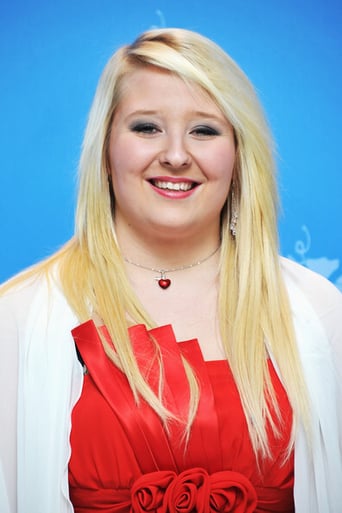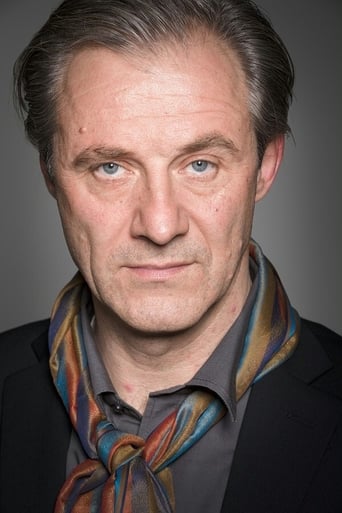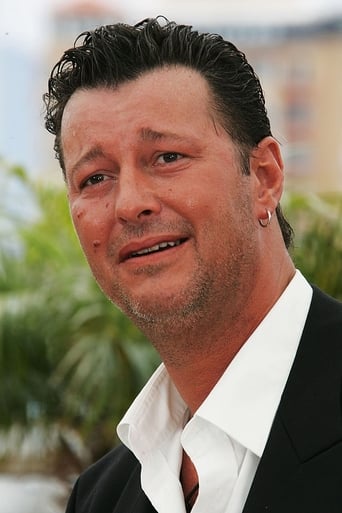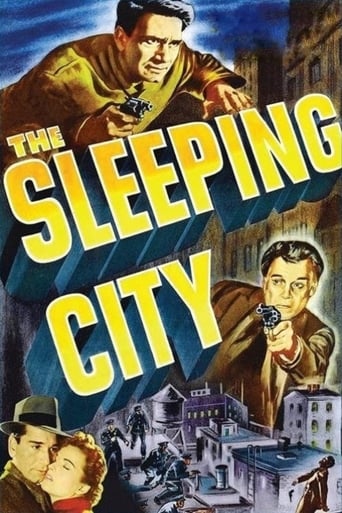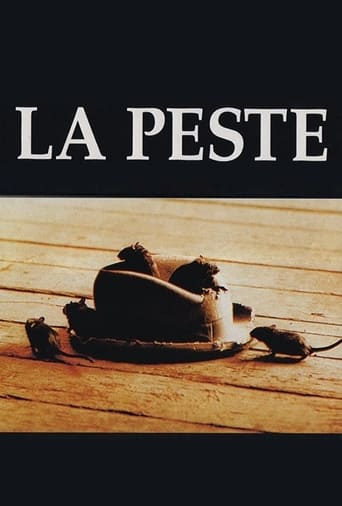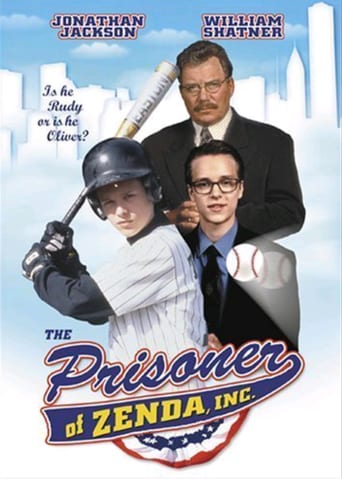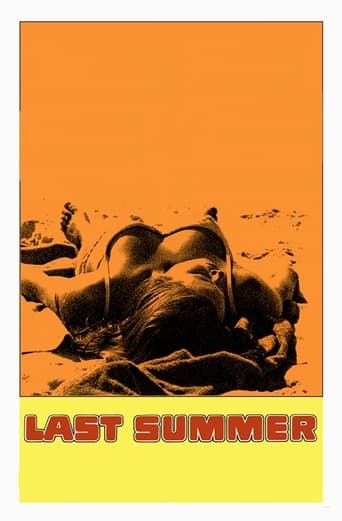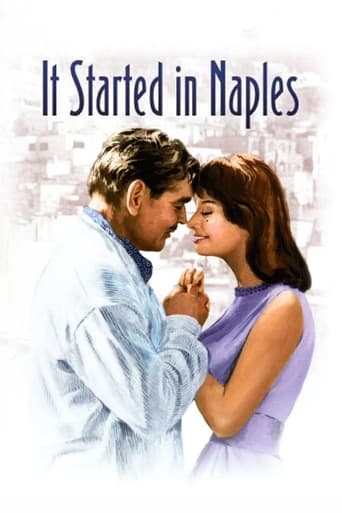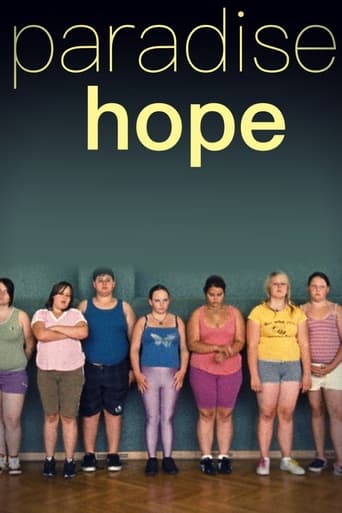
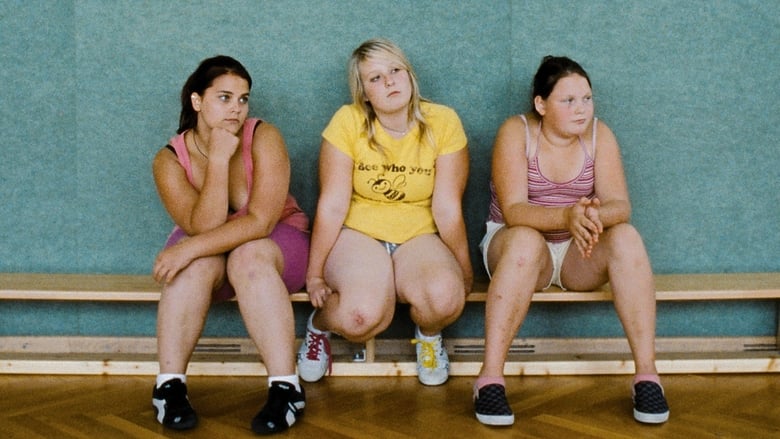
Paradise: Hope (2013)
Her mother in Kenya, 13-year-old Melanie spends her summer vacation at a strict diet camp set in the Austrian countryside. Between workouts and nutrition classes, pillow fights and first cigarettes, she falls in love with a doctor 40 years her senior.
Watch Trailer
Cast
Similar titles
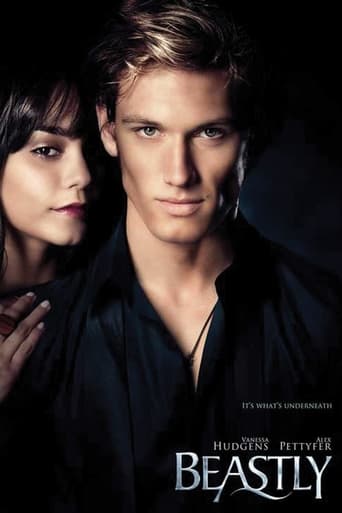
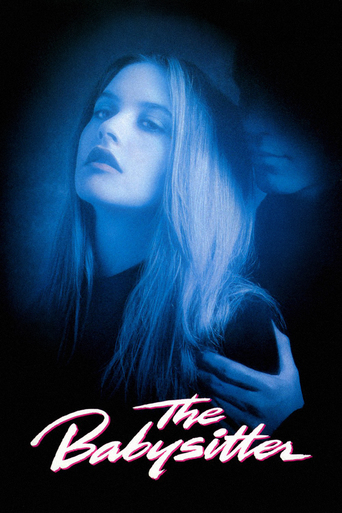
Reviews
Powerful
Boring, over-political, tech fuzed mess
Pretty good movie overall. First half was nothing special but it got better as it went along.
There's no way I can possibly love it entirely but I just think its ridiculously bad, but enjoyable at the same time.
For my taste, this is the worst of the trilogy. And that is already difficult. In the others there was a small story, but it is that in this there is not even that.I still do not know what the title of hope is coming from, what hope? The sequences are eternal. They never end. But they do not count anything. They are repetitive. Tell the same thing over and over again. On this occasion, only at the end begins to tell something different and is lost and no longer counts.Would we say the actors are okay? Well, counting that it is not known that it is counted and that many planes are without dialogue. The actors are.Not that it is boring, not that it has a slow tempo, is that to know that you have to see a story and thus you see how the account, but it is that there is no history nor there is nothing.Photography, like the rest, does not count either. But it is normal as it will be if there is no story. He has nothing to tell.The direction, telling that he is not directing anything, that he does not know that he is counting, that he only knows to roll in general plane and never moves the camera, nor does he change the plane never, although it is necessary. Someone put the camera in the bottom of each place and there it stayed.If with the others you seem to have wasted time with this, it is clear
Ulirch Seidl's 'Paradise' trilogy focuses on female unhappiness: the first two movies were almost unwatchably painful, as they charted their protagonists' unfortunate plights and self-harming behaviour. The third film is not quite so gloomy, although its title 'Hope' is almost certainly meant ironically, but there is hope here, if only because it's younger characters still have the chance to turn around their lives. Equally, the film's purpose seems a little less clear than its predecessors: some overweight, but basically normal teenagers attend a weight-loss camp, where they face a measure of abuse from the adults who run it. The most poignant moment in the film comes when the lead character, the daughter of the protagonist in the first film, desperately calls her mother (who we know to be trapped in her own form of hell), a sign of a human bond that has hitherto not been revealed. Overall, it's still hard to know what to make of the trilogy, except as a series of observations on quite how hard it is to make meaningful connections with those around us.
"Paradies: Hoffnung" or "Hope" is the 3rd and final installments to Ulrich Seidl's "Paradise" trilogy. After fairly heavy material in "Love" and "Faith", this one is a bit lighter. However, it still has its serious moments. It is the shortest from the 3 movies as it only runs for roughly 90 minutes and also the one that got the least awards attention. Still, it is a pretty good film in my opinion. The protagonist here is the obese daughter/niece from the protagonists of the other 2 films. Hofstätter has a cameo in here as well at the beginning. The girl's name is Melanie and she is sent to summer camp to lose weight. Basically, for the entire film we watch her routine at the camp. Seidl chooses a mix of comedy and drama again. The tough sports coach is fun to watch with his determination and lets be honest: fat children making sports is a funny sight, no offense. When one after the other makes forward rolls from the left of the screen to the right, there is something hilarious to it. Another funny scene would be when the gang tries to steal candy at night and they get caught by the PE teacher again.However, this is by no means a comedy. There are many serious moments in here. The P.E. coach is for the humor, the doctor is for the drama as he is at least as attracted to the main character as she is to him. This results in many complicated situations and, ultimately, in heartbreak. But the girl is really only looking for somebody to understand her, enjoy spending time with her, which was probably something her mother neglected, even if she came across as a caring mother from the first film in my opinion. Anyway, the girls' calls say a lot in this film. She does not want to ruin her mother's holiday in Kenya (now that was a holiday!), so she says it is all good at the camp, but she tells the truth to her father because she knows he won't care anyway. In the end, however, she is also honest towards her mother. Her mother is her ultimate attachment figure again after the doctor "broke up" with her and her best friend left her alone at the club when she was in really bad condition.I have never been at such a camp because I never had weight problems and looking at this one here, this may have been a good thing. But even with all the drama going on, I felt that, overall, this was a lighter watch than the other 2 films, especially "Faith". I definitely recommend this trilogy, very well done from Seidl and everybody who worked on this massive project, especially the 3 lead actresses. Now let me clap my (non-existing) fat because I'm happy I got to watch these. Thumbs up and I recommend "Hope" just like I recommend the previous 2.
Austrian screenwriter, producer and director Ulrich Seidl's fifth feature film which he co-wrote with screenwriter Veronika Franz and co-produced, is the last part of his partly theological Paradise trilogy which was preceded by "Paradise: Love" (2012) and Paradise: Faith" (2012). It premiered In competition at the 63rd Berlin International Film Festival in 2013, was shot on location in Austria and is a Austria-Germany-France co-production which was produced by producers Philippe Bober and Christine Ruppert. It tells the story about a 13-year-old girl named Melanie who whilst her mother named Teresa is on vacation in Kenya is taken to a diet camp by her aunt named Anna Maria where she befriends a girl named Verena and takes a liking to a doctor.Precisely and statically directed by European filmmaker Ulrich Seidl, this quietly paced fictional tale which is narrated from multiple viewpoints though mostly from the main character's point of view, draws a heartrending portrayal of a girl's experiences whilst participating in a residential program. While notable for its naturalistic milieu depictions, distinct production design by production designers Andreas Donhauser and Renate Martin, cinematography by American cinematographer Edward Lachman and Austrian cinematographer Wolfgang Thaler and use of colors, this somewhat character-driven and dialog-driven story about friendship and hope depicts a mindful study of character where the rare humor occurs as a result of the at times rhythmic and subtle continuity.This humane, involving and somewhat surreal sequel which is set mostly at a weight loss resort in Austria and where an adolescent girl begins looking for the same thing that her mother is looking for in Kenya, is impelled and reinforced by its cogent narrative structure, substantial character development, colorful characters, sparse dialog and the reverent and commendable acting performances by actress Melanie Lenz in her debut feature film role, Austrian actor Joseph Lorenz and actress Verena Lehbauer. A minimalistic, characteristic, sociological and atypical coming-of-age drama where Ulrich Seidl's dystopic universe which may not be for all tastes and where he has gone to the extremities of humanity with a bittersweet, realistic and somewhat bleak though far from melancholic point of view comes to an end.
